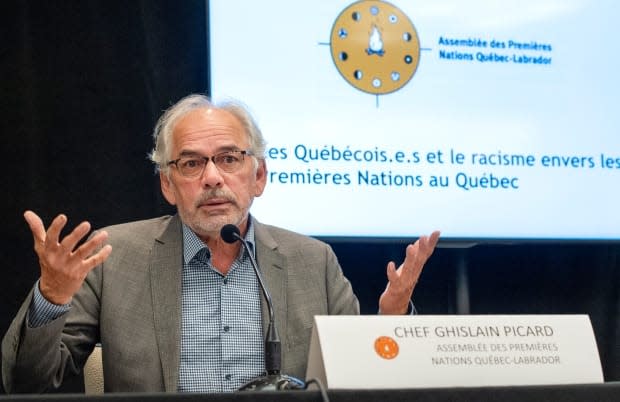First Nations leaders in Quebec develop own anti-racism plan a year after Viens Commission
Rather than waiting for the Quebec government to implement recommendations from three recent commissions, the Assembly of First Nations Quebec-Labrador (AFNQL) has produced its own action plan to address racism and discrimination.
"Racism is present as it is everywhere in public services, hospitals, in police services, in youth centres, even in our schools," said AFNQL Chief Ghislain Picard, announcing the plan Tuesday via a virtual news conference.
"Our intention is not at all to blame anyone nor to accuse anyone of being a racist. I am well aware that the racism is not always intentional, it is often the result of unconscious biases."
The plan consists of 141 suggested actions on how individual citizens, organizations and groups, media, educational institutions, municipalities, policing and justice services, as well as businesses can get involved. They range from individuals reading the United Nations Declaration on the Rights of Indigenous People to municipalities providing training on cultural differences and Indigenous history and issues to its employees.

They're all based on recommendations and findings from the 2015 Truth and Reconciliation Commission's final report, as well as last year's reports from the national inquiry into missing and murdered Indigenous women and girls and Quebec's Viens Commission that looked into the treatment of First Nations and Inuit in Quebec by the public service.
"There have been many recommendations that have unfortunately for the most part been forgotten," said Verna Polson, Grand Chief of the Council of the Algonquin Anishnabeg Nation and spokesperson for the AFNQL Council of Elected Women.
"It is no longer enough to ask for change. We must be the change."
First Nations youth want systemic racism recognized
Sept. 30 marks one year since retired judge Jacques Viens released his findings from the commission. It led to Quebec Premier Francois Legault apologizing and acknowledging that the Quebec government is not doing enough but Picard said there's been little movement since.
The two parties only met twice since — once in October 2019 and again in January 2020 — to discuss terms of reference for the province's response to the report.
"We are doing them a favour today by presenting them with the minimum actions that have to be taken," said Picard.
"This plan is not intended to relieve the government of its responsibilities, it's really up to them. The government can and must do better."
A spokesperson for the office of Quebec Indigenous Affairs Minister Sylvie D'Amour said in a statement it welcomes all ideas and actions aimed at counter racism or discrimination.
"We thank the AFNQL for its initiative and we will read this action plan with great interest and analyze its recommendations," the statement read.
"We must all work together if we want to curb racist behaviour toward all communities."

Cedric Gray-Lehoux, a spokesperson for the First Nations of Quebec and Labrador Youth Network, said he and his peers are calling on the Quebec government to recognize and to admit systemic racism exists within its institutions — something the premier denied three months ago.
"We are also calling on Quebecois — our brothers and sisters who with we share this land — to join us, stand by our sides, and be our allies," said Gray-Lehoux.
"We must come together if we want to create a real change in this world and we must come together to call out the injustices that First Nations people have to face every single day."
The action plan was announced a day after Radio-Canada reported the death of an Atikamekw woman in the hospital in Joliette, Que., on Monday under troubling circumstances. Picard said it was impossible not to refer to her death as a "sad coincidence."
"It serves as a reminder that the mountain is steep but we have to take it on. It's for the benefit not only for ourselves, but for generations who follow in our footsteps," he said.


